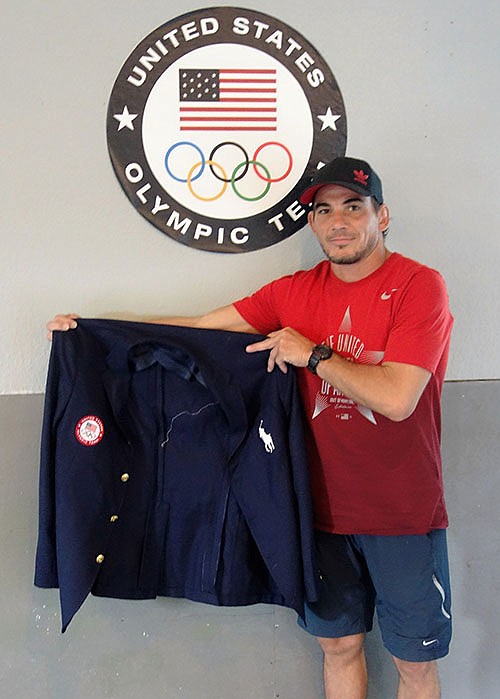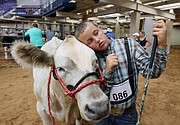A local kid's club wrestling coach who took his unorthodox methods all the way to the Olympics is finally back in town.
"I was there for 20 days, and I was able to see all the guys training," said Mike Eierman, head coach of Eierman Elite Wrestling in Millersburg. "(The amenities) were OK. They really weren't that bad. It's not the nicest, cleanest place in the world. We had a great training environment, and the food was good."
Eierman, who was in Rio de Janeiro to support his star pupil, Olympian wrestler J'den Cox, said the rush he received from being at the Olympics was unparalleled.
"It was really amazing, but the most impressive part of it was J'den Cox," he said. "He blew my mind. It was an emotion I can't even explain. I still get goosebumps thinking about standing in the tunnel and getting ready to walk out."
Eierman met Cox 13 years ago while working as a wrestling coach at the University of Missouri and coaching a kid's club on the side. A former All-American wrestler for the University of Nebraska, Eierman said watching one of his wrestlers succeed far outweighed his individual accomplishments.
"It's not even close to my own individual success," he added. "It was so much more exciting being in his corner and seeing it happen than being a competitor."
After he finished his competitive career, Eierman said he wanted to start coaching, but he also wanted to try to change the way kids were taught.
"As a competitor, when I got done competing, I knew I wanted to be a coach," he said. "Where I stopped as a competitor is where I wanted to start coaching from there. I'm coaching kids because I chose to coach kids. I enjoy it. I truly believe this is the age where a lot of skills are developed."
The way Eierman teaches his kids could be considered by some to be unorthodox, he said. His coaching style clearly contrasted with some of the other coaches' at the Olympics.
"I know we made other coaches uncomfortable because he and I just wrestled around and had fun," he said. "The other coaches finally started to come around and see this was the way he worked."
One of the stark contrasts of coaching style, Eierman said, became apparent when it came to watching video footage of other wrestlers.
"I can watch them, they can't," he said concerning his wrestlers. "If they watch, they focus on what the other wrestler does as opposed to what they can do. They wanted us to study videos and watch the other wrestlers. Everybody else studies videos, but J'den didn't know who he was wrestling until he was on the mat."
Not watching videos or even stopping to watch the match of potential competitors, Eierman said, is a lesson he learned during his collegiate career.
"When I was an All-American, my coach made me watch video of my matches," he said. "One time when we were watching it, in the top corner, I could see my next opponent walk by the mat, stop and kneel to watch my match. That's when I knew I had him. He was worried."
The mental game, Eierman added, is just as if not more important than any other part of wrestling. He also teaches his wrestlers they need to lose to win.
"It's a development," he said. "It takes learning how to lose and put things into perspective. When my kids lose, I praise them for trying a new move. Once you become nervous and scared of losing, you make mistakes."
All the training, Eierman said, is what made Cox's wrestling so fun to watch.
"He puts every ounce of his life into those matches," he said. "He was so tired he couldn't lift his arms and legs when he got done. I don't even think we've seen the final J'den. I think there's a ton of room to grow; he's very impressive."
While wrestling in the semifinals, with the winner moving on to the gold medal match, Eierman said Cox experienced a minor setback.
"With two minutes left in the match, Bill Zadic, the Olympic coach, was ahead of me, and I could see we were losing," he said. "We really didn't know that J'den didn't know he was losing. Everyone was screaming, but he couldn't hear because he's going deaf in one ear."
Cox ended up losing the match, but his unorthodox training showed through and further impressed everyone, Eierman said.
"After he'd lost, he came in with a smile and said, let's get the bronze," he added. "I don't think there's anyone else in the world that could react like that."
The unconditional love from Cox's family, who was in the stands watching, was also inspiring, Eierman said.
"After J'den lost, he wanted to go up to see his family, but we were prevented from doing so," he said. "His mom looked up, smiled, and said 'Love ya.' It was a special moment to see, especially right after he had just lost. It wasn't a normal loss - his parents could have been upset - but they just said, 'love ya.'"
Throughout the whole experience, Eierman said, the unity between all the wrestlers was also impressive.
"I definitely think J'den bonded for sure," he added. "I saw him joking with wrestlers from other countries. The Russian who won gold came back as soon as he was done with his match and hugged J'den and I; there were some bonding moments there. They're all modern-day warriors, so they have a lot in common."
After reaching the pinnacle as a wrestling coach, Eierman said when he got home, he jumped right back to the drawing board more motivated than ever.
"I'm going to be back at the Olympics, that's my goal. Yes, coaching at the Olympics is a pinnacle, but the pinnacle now is going back again," he said. "They had a welcome home party for me when I got home, but I was ready for practice. I can't wait for practices. I learned so much down there that I want to teach the kids."
Eierman said he welcomes all wrestlers, even those with existing clubs, to learn to wrestle the Eierman way.
"I wish we'd get more local kids and give them all we can," he added. "They can wrestle for their club or school and come here on the side for training and add to their arsenal of what they're doing. They're good, but they could be better."
Above all, Eierman said, he learned from Cox the necessity to believe in oneself.
"Anything is possible," he said. "If you do things right, right things will happen to you."


